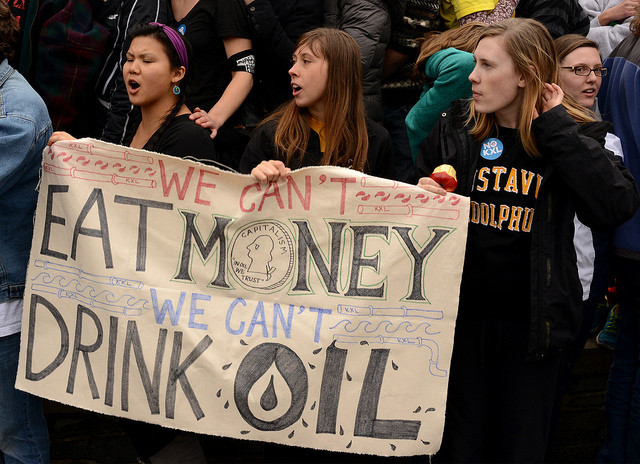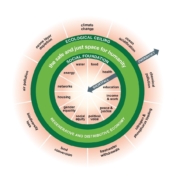More People, Less Unemployment?
by Max Kummerow
Bill Clinton took a welcome step toward reality. In his Democratic Convention speech, he pointed out that cutting taxes on rich people and fighting endless wars increased federal debt, and more of the same would make things even worse. Tax cuts and deregulation during the Bush administration failed to bring prosperity and helped cause the global financial collapse and widespread joblessness.
The Chicago School of economics has been preaching for decades, with lots of money from rich people adding to the volume of their message, that low taxes, small government, and deregulation are the road to nirvana. But the last time we had low taxes on the rich and little regulation was called the Great Depression. Clinton, at least, has come to understand that America made a mistake in believing the fairy tale that “government is the problem, so let’s cut rich people’s taxes.”
Clinton still remains bamboozled, however, by the neoclassical nonsense that sees economic growth as the solution to unemployment. On the Daily Show Clinton offered a demographic path to prosperity. He opined that because most of America’s competitors — Russia, Japan, China, and Europe — have low birth rates and aging populations, we will have a younger workforce with a lower old-age dependency ratio, so growth will solve our unemployment and debt problems.
But the notion that population growth cures unemployment is false, just like the idea that cutting taxes on the rich raises revenue and cuts the deficit. The immigration and higher birth rates that keep the population younger also guarantee a higher young-age dependency ratio and a growing population. In a world constrained by high commodity prices and other symptoms of reaching the limits to growth, a growing population leads to high unemployment, rising cost of living, and falling wages. If a young population leads to prosperity, why aren’t places like Nigeria, Rwanda, and Uganda thriving? Why has China gotten so much richer since starting its “one-child” policy?
The fertility rates in all the Asian tiger economies dropped below the replacement level during the decades when their economic output increased dramatically. Hong Kong and Singapore, places with no natural resources and aging populations, have a higher per capita income than the United States. Hong Kong’s 0.97 children per woman and Singapore’s 1.26 are two of the lowest fertility rates in the world.
Birth rates that low mean each generation inherits twice as much as the one before, and a future economy can have full employment with half as many jobs. Scarcer labor means higher wages. New technology and rising productivity can be used to raise incomes instead of what happens with a growing population (i.e., society treads water as the benefits of increasing productivity are canceled out by more people consuming more resources). Low fertility is the path to high incomes and abundance. High fertility is the path to poverty and scarcity.
America’s ongoing population growth has played a role in causing higher unemployment rates, more difficulty funding education, falling real wages for workers, and the incarceration of two and a half million people. You would think that in a country where oil production has fallen by 40% since 1972, a country responsible for so much of the global climate change problem, where forests have been burning, cities have been wrecked by hurricanes, and crops have been withered by drought, we would have learned that more growth is not the answer to unemployment and budget deficits.
Bill Clinton should read ecological economists like Herman Daly. He should pay attention to systems thinkers such as Donella Meadows and Bill McKibben, and consult Al Gore about our ethical responsibilities to future generations. Growth cannot be the solution to unemployment. If all countries decide to grow their populations and their economies, ice will melt, putting cities under sea level, oil will run out, food prices will rise, wages will fall, and human welfare will be reduced, not increased. We will be poorer and fewer people will be able to find jobs.
Common sense says that continuously increasing population makes it harder to keep everyone employed, not easier. The problem is not too few jobs; it’s too many people. There are already too many people consuming too much and diminishing the earth’s long-run carrying capacity. Economic growth is running into the wall of limited resources on a finite planet. The trends created by economic growth and population growth include higher carbon emissions and climate change, loss of forests, depleted fisheries, soil erosion, species extinctions, toxic contamination, and the possible negative effects of technologies like fracking and genetically modified foods. The path the world is on — economic and population growth — is just as unsustainable as the subprime mortgage market and trillion-dollar federal deficits and will lead to collapse.
Long-run prosperity on a planet with limited land and water and air requires a transition to a steady state economy — a transition which in turn requires a transition to a smaller global population. The higher fertility rates, immigration, and economic growth that Clinton described as the path to prosperity turn out to be the path to collapse.
Do the arithmetic, starting with this year’s federal deficit, the short crop in the Corn Belt, the number of Americans in jail, and cuts to education budgets. Growth has not been the path to full employment or deficit reduction. If Romney was right about tax cuts, we wouldn’t have a federal debt crisis. If Clinton was right about population growth, we wouldn’t have unemployment. It’s time to try something beyond politics as usual.
—
Max Kummerow has a Ph.D. in urban and real-estate economics. This semester he is a visiting lecturer at Lincoln University in Canterbury, New Zealand.






Another CASSE editorial that makes entirely TOO much common sense. I feel that the CASSE message needs to be delivered directly to the White House. Delivering the message of this editorial directly to Bill Clinton might have a bigger impact because he is so intelligent and has much influence. Also, Bill Clinton may not be as intimidated by politics as our current politicians. Is it possible to gain access to these people?
==Green Jobs, Unemployment and Tax Shifting==
One perishable resource that is currently wasted shows up as unemployment. The resource of our labor is unique; it vanishes if not used – you can’t save today’s ability to work, if unused, for tomorrow.
A day unworked is gone forever, and with about one of five of USers out of, or short of, work, according to Shadow Stats in 2012, that’s a lot of missed work left undone. If done, that work could have served the common good, and helped to pay taxes, and pay workers.
Labor is a strange resource; we waste it by not using it. We need to use more of the labor that we have enough of, and less of the resources we’re running out of, instead of striving for labor efficiency while unemployment and resource overuse ruin our world.
We need Full Employment and Steady State Economics, and we can get them, together.
There should be, and there can be, too many jobs, and they should be green jobs that build a sustainable integration of us humans and the rest of the natural world.
At the same time, more economic growth now is cancerous. Humanity is fully mature; there is neither room nor resources in earth for further dependence on physical growth to address poverty or inequality, which growth has anyway consistently failed to address. Hence along with Steady State Economics must come reduction of inequality through [[Poverty]] Elimination.
How can we have too many green jobs when we don’t seem to have enough jobs now? For too long we’ve eliminated labor with rare resource use via technology, creating more and more pollution and leaving less and less resources for our children. The good news is that this is unneeded. We can stop eliminating labor, have enough jobs, and save resources for our children.
But How? Currently we tax labor and subsidize oil and resource use. Reversing this will lead us out of this miserable jobless techno-tunnel we’ve been stuck in. We can shift taxes from goods to ‘bads’; stop taxing jobs and instead tax resource use, like with carbon taxes. This will increase hiring by bosses who will avoid these new taxes by using resources more efficiently, replacing them with labor, creating jobs. This will also reduce pollution and the asthma and other sicknesses that pollution causes, while saving resources for our children.